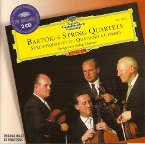Bartók String Quartets
Written by Eric Rasmussen on August 22, 2010.
Bartók: 6 String Quartets

Hungarian String Quartet (2-disc)
If my commentary below conveys to you one thing, I sincerely hope it is this: beware Bartók.
It may seem a strange warning for a work that is so highly regarded among musicians. What is there to be afraid of, you ask? I find it difficult to quantify. I do not have the technical language to convey to you the subtleties and nuances in the way the quartet instruments are used, and nor can I tell you how or why it is often considered the most important string quartet cycle since the 19th century. But what I can tell you, unequivocally, is this is no work to be trifled with. Bartók effortlessly speaks a language all his own, at once coherent and mad, and being too close to this level of raw artistic power is akin to flying too close to the sun.
The movements do not portray moods in the traditional Western sense. The musical language is far removed from the classical and romantic works that precede it. The discordant and unexpected harmonies are so fully brought to life by the Hungarian String Quartet that you will find yourself quickly traveling down the rabbit hole into a land of wonder and terror. The constant dissonance gives the music oppressive qualities, but it is often mixed with rising melodies that may not convey joy, but nor do they lament. The overall effect is of visiting an unfamiliar place, being out of your element and unsure of what’s around the corner. You remind yourself that many others have made the journey and came out unscathed, but you can’t help but wonder if you will be the one that doesn’t make it back.
Bartók’s compositions are striking in the way of surreal art, where you feel as if you are teetering between madness and brilliance, peering too deeply inside the mind of the artist. However, the strong feelings I have would not be possible without the passionate playing of the Hungarian String Quartet. I could say all the usual things about their musical abilities, but what stands out most is their intimacy with the underlying musical ideas. After hearing this recording, I cannot imagine hearing the pieces played any other way. For those who value artistic expression above all else, I highly recommend tracking down a copy of this CD. It’s not widely available, but at the time of this writing can still be purchased through Arkiv Music.
